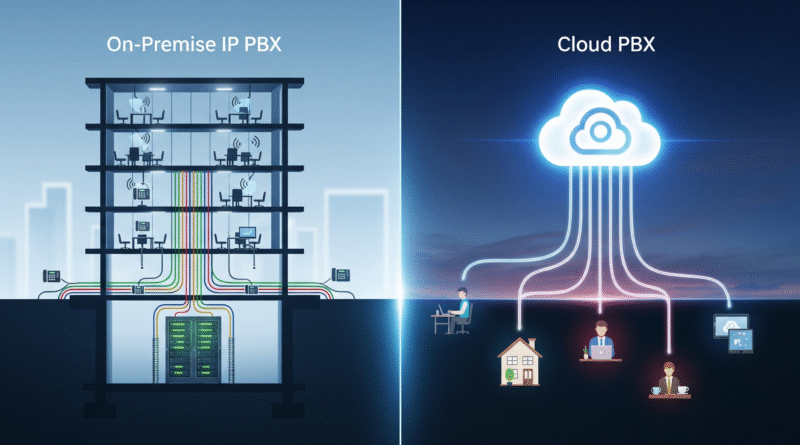The Great Debate: Which IP PBX Model is Right for Your Company’s Future?
In 2025, a modern phone system is no longer a luxury for a growing business; it’s a necessity. The days of relying on traditional, rigid telephone lines are over. Today, smart companies are using the power of the internet to manage their communications through an IP PBX System. This technology is a game-changer, offering flexibility and advanced features that were once unimaginable.
But once you decide to upgrade, you face a critical question: which type of IP PBX solution is right for you? This isn’t just a technical choice; it’s a strategic decision that will impact your company’s budget, flexibility, and future growth. The great debate comes down to two main models: hosting the system yourself (on-premise) or letting an expert handle it for you (in the cloud).
The Two Sides of the IP PBX Coin
To understand the choice, let’s look at two business owners in Chennai who are both upgrading their phone systems.
First, there is Sunil, who runs a manufacturing company with a large, single-site factory. He has a dedicated IT team and prefers to have complete, physical control over his infrastructure.
Second, there is Meera, who owns a fast-growing digital marketing agency with employees spread across Chennai, Bengaluru, and some working from home. She values flexibility and wants to avoid the headache of managing hardware.
Their different needs will lead them to two very different, but equally valid, conclusions.
The On-Premise IP PBX: Control and Customization
An on-premise IP PBX means you buy the physical server hardware and house it in your own office or data center. You own the equipment, and your internal IT team is responsible for its management and maintenance.
For a business owner like Sunil, this model is very appealing.
- Complete Control: Sunil’s IT team can customize the IPPBX Software to their exact specifications. They have total control over the system’s security, features, and how it integrates with their other factory systems.
- One-Time Cost: While the initial investment in hardware is high, it’s a one-time capital expense. After that, there are no recurring monthly subscription fees for the core system.
- Internal Call Traffic: Since most of Sunil’s calls are between different departments within the same factory, the on-premise system can handle this internal traffic without ever touching the public internet, which can sometimes be an advantage for voice quality.
However, this model has significant downsides, especially for a business like Meera’s. It requires a large upfront investment, a skilled IT team to manage it, and it’s not very flexible if you have a remote or distributed workforce.
Also Read: 10 Strategic SEO Insights & Tips for 2025 and Beyond
The Cloud PBX: Flexibility and Freedom
The second option is the Cloud PBX Phone System. In this model, you don’t own any hardware. Instead, you subscribe to a Cloud Telephony service. A specialized provider hosts and manages the entire phone system in their own secure data centers, and you access it through the internet.
For a business owner like Meera, the benefits are immediately obvious.
- Unmatched Flexibility: Her employees in Bengaluru and those working from home can all connect to the same phone system using an app on their laptops or smartphones. They are all part of the same network, no matter where they are.
- Low Upfront Cost: There is no expensive hardware to buy. She simply pays a predictable, monthly subscription fee per user, which is great for managing cash flow.
- No Maintenance Headaches: The provider handles all the security, updates, and maintenance. Meera’s team can focus on their marketing work, not on managing a phone server.
- Effortless Scalability: When Meera hires three new employees, she can add them to the system in minutes with just a few clicks. The system grows with her business effortlessly.
This model provides the ultimate freedom and is perfect for modern, distributed companies.
Final Thoughts: Which Future is Right for You?
So, which model is right for your company’s future?
There is no single right answer. It depends entirely on your business’s unique needs.
- If you are a large, single-location company with a strong internal IT team and a need for deep customization, an on-premise IP PBX system might be the right choice.
- However, for the vast majority of modern businesses that value flexibility, have remote or hybrid teams, and want to avoid the complexities of managing hardware, a Cloud PBX is the clear winner.
The most important thing is to make a conscious choice. Analyze your needs, understand your priorities, and choose the IP Telephony System that will empower your business to communicate and grow effectively in the years to come.

